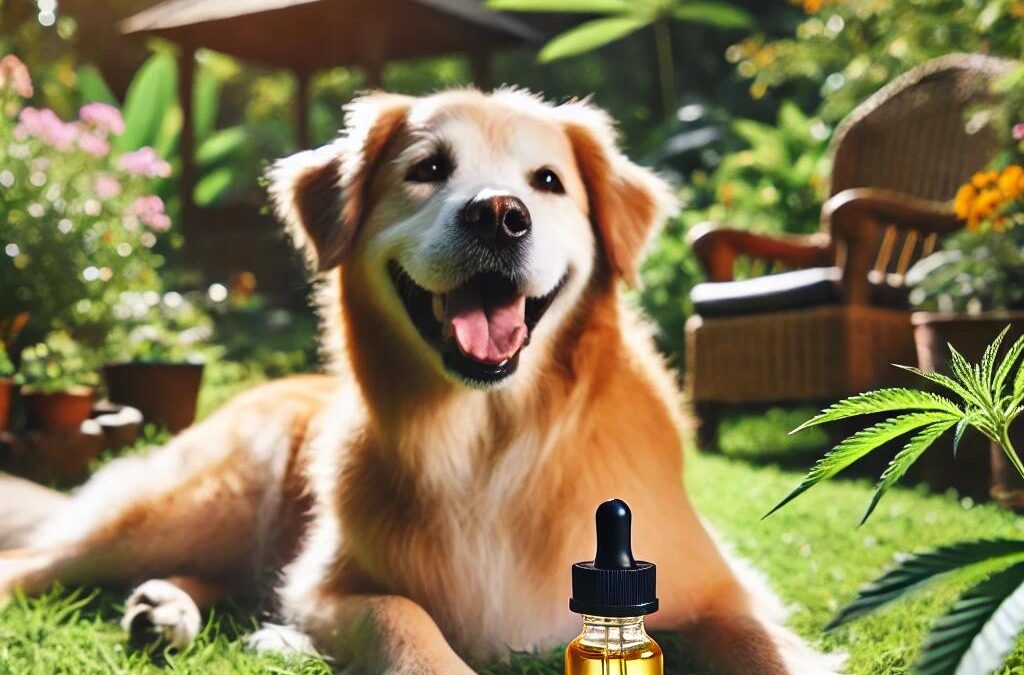
by TCMVET | Sep 10, 2024 | Food & Health
Cruciferous vegetables, such as broccoli, are not just superfoods for humans; they can also provide significant health benefits for dogs. Packed with nutrients, antioxidants, and cancer-fighting compounds, these vegetables are becoming a popular addition to canine diets, especially for dogs facing cancer. Let’s explore how broccoli and its cruciferous cousins can contribute to your dog’s overall health and potentially aid in cancer prevention.
The Health Benefits of Broccoli for Dogs
Broccoli is one of the most nutrient-dense vegetables you can offer your dog. Rich in vitamins A, C, and K, as well as fiber, calcium, and antioxidants, broccoli delivers a wide range of health benefits.
1. Powerful Antioxidants: Broccoli is packed with antioxidants, which play a vital role in neutralizing harmful free radicals. These free radicals can cause oxidative stress in your dog’s body, which may lead to cell damage and even cancer. By including antioxidant-rich foods like broccoli in your dog’s diet, you may help reduce the risk of cancer development.
2. Supports the Immune System: The combination of vitamins, minerals, and antioxidants in broccoli gives your dog’s immune system a natural boost. A strong immune system is crucial for dogs fighting cancer or recovering from illness, as it helps the body ward off infections and inflammation.
3. Anti-Inflammatory Properties: Inflammation is a key player in many chronic conditions, including cancer. Broccoli contains compounds with anti-inflammatory properties, which may help reduce inflammation in the body and provide relief for dogs with arthritis, allergies, or chronic pain.
4. Aids in Detoxification: Broccoli is known for its detoxifying properties. It contains phytonutrients that help support the liver’s ability to detoxify harmful substances in your dog’s body. A healthy liver is essential for maintaining overall health and supporting your dog’s natural defenses.
Other Cruciferous Vegetables to Include in Your Dog’s Diet
While broccoli is a top choice, it’s not the only cruciferous vegetable that can benefit your dog. Other vegetables in this family, such as cabbage, kale, Brussels sprouts, and cauliflower, are also loaded with nutrients and cancer-fighting compounds. Including a variety of these vegetables in your dog’s meals can provide a more diverse range of health benefits.
Here are some other cruciferous vegetables to consider:
- Cabbage: High in fiber and vitamins, cabbage can help improve digestion and support the immune system. Lightly steam it for easier digestion.
- Brussels Sprouts: These mini powerhouses are rich in vitamins and antioxidants that can help reduce inflammation and promote overall health.
- Kale: Known as a superfood, kale is full of antioxidants and phytonutrients that contribute to cancer prevention and boost the immune system.
- Cauliflower: Like broccoli, cauliflower is rich in vitamins and minerals that support detoxification and reduce inflammation.
How Cruciferous Vegetables Fight Cancer
One of the key reasons cruciferous vegetables are so effective in cancer prevention is their high content of glucosinolates. When these compounds are broken down during digestion, they produce biologically active compounds such as sulforaphane and indole-3-carbinol, both of which have been studied for their anti-cancer properties.
Sulforaphane, in particular, has been shown to inhibit the growth of cancer cells and even trigger cancer cell death in some cases. By feeding your dog cruciferous vegetables, you’re providing a natural source of these powerful compounds, which may help in preventing or slowing the progression of cancer.
Safe Ways to Feed Cruciferous Vegetables to Dogs
When it comes to adding cruciferous vegetables to your dog’s diet, moderation is key. Too much broccoli or other cruciferous vegetables can cause digestive upset, such as gas or bloating. It’s best to lightly steam these vegetables to make them easier for your dog to digest and absorb their nutrients.
Start with small portions and observe how your dog reacts. If your dog tolerates the vegetables well, you can gradually increase the amount. However, it’s always a good idea to consult your veterinarian before making any major changes to your dog’s diet, especially if your dog is undergoing treatment for cancer.
Cruciferous vegetables like broccoli are more than just a healthy snack for your dog—they’re a powerhouse of nutrients and cancer-fighting compounds. By incorporating these vegetables into your dog’s meals, you can help boost their immune system, reduce inflammation, and potentially prevent or slow down cancer progression. Remember to introduce these vegetables slowly and consult your vet to ensure they are safe for your dog’s individual health needs.

by TCMVET | Sep 10, 2024 | Dog Cancer & Tumors
Chaga mushroom, a peculiar fungus found on birch trees in cold climates, has been gaining popularity as a potential natural remedy for various health issues, including cancer. While its rough, blackened appearance might seem unattractive, its health benefits have sparked interest in both human and veterinary medicine. Could this strange mushroom be a miracle cure for canine cancer?
What is Chaga Mushroom?
Chaga (Inonotus obliquus) is a parasitic fungus that primarily grows on birch trees in northern regions such as Siberia, Alaska, and Canada. It has been used in traditional medicine for centuries, particularly in Russia and Eastern Europe, where it’s revered for its ability to boost the immune system, fight inflammation, and support overall health.
Rich in antioxidants, Chaga contains compounds like polysaccharides, beta-glucans, and triterpenoids, all of which contribute to its potential healing properties. In humans, Chaga is used to enhance immune function and has been investigated for its anti-cancer properties. But how does it work for dogs?
Chaga Mushroom and Canine Cancer
Canine cancer is a devastating diagnosis for any pet owner. Traditional treatments like chemotherapy and radiation often come with significant side effects, leading many dog owners to seek alternative or supplementary therapies. This is where Chaga mushroom comes in.
1. Immune System Boosting: One of Chaga’s primary benefits is its ability to enhance immune system function. The beta-glucans in Chaga stimulate the immune response, helping the body to fight cancer cells more effectively. For dogs undergoing cancer treatment, a stronger immune system can support recovery and improve overall well-being.
2. Anti-Inflammatory Properties: Chronic inflammation is linked to cancer growth in both humans and animals. Chaga’s powerful anti-inflammatory properties may help reduce the inflammation associated with cancer, potentially slowing down tumor progression in dogs.
3. Antioxidants for Fighting Free Radicals: Chaga is packed with antioxidants, particularly superoxide dismutase (SOD), which helps neutralize free radicals. Free radicals can damage cells and contribute to cancer development, so reducing their impact may protect your dog’s health.
Is Chaga Safe for Dogs?
While Chaga mushroom shows promise as a natural remedy for canine cancer, it’s important to consult your veterinarian before adding any supplements to your dog’s diet. Each dog is unique, and what works for one may not be suitable for another, especially if your dog is undergoing cancer treatments like chemotherapy or radiation.
Chaga supplements for dogs are available in various forms, including powders and tinctures. Always ensure the product is sourced from high-quality, organic Chaga to avoid contamination with harmful substances. Additionally, follow dosage recommendations carefully to prevent potential side effects such as digestive upset or liver strain.
How to Administer Chaga to Dogs
If your veterinarian approves Chaga as part of your dog’s cancer care plan, you can typically add it to their food or administer it in tincture form. Many dog owners report improvements in their dogs’ energy levels, appetite, and overall health after introducing Chaga into their diet.
Chaga mushroom is not a magical cure-all, but it holds significant potential as a complementary treatment for canine cancer. Its immune-boosting, anti-inflammatory, and antioxidant properties make it a promising natural remedy for supporting dogs through their cancer journey. However, always work closely with your veterinarian to ensure that Chaga is safe and appropriate for your pet’s specific needs.

by TCMVET | Sep 10, 2024 | Dog Cancer & Tumors
Keeping your dog at a healthy weight is about more than just mobility and overall well-being—it’s also a crucial aspect of cancer prevention. Studies show that obesity in dogs significantly increases the risk of cancer, primarily due to the chronic inflammation associated with excess body fat. By maintaining an ideal weight through a balanced diet and regular exercise, you can help reduce your dog’s risk of developing cancer while promoting a longer, healthier life.
The Link Between Obesity and Cancer in Dogs
Excess body fat in dogs can trigger a cascade of health problems, from joint issues to heart disease, but one of the lesser-known risks is cancer. Research published in the Veterinary Journal highlights the correlation between obesity and an increased likelihood of certain types of cancers in dogs, including mammary tumors and bladder cancer. Chronic inflammation caused by excessive fat tissue is believed to be a key driver of this increased risk. Inflammation creates an environment in which abnormal cells can grow, increasing the chance of cancer development.
Dogs that are overweight or obese also experience higher levels of oxidative stress and hormone imbalances, both of which contribute to cancer formation. Hormones like insulin and leptin, which are affected by obesity, play a role in cell growth and proliferation, potentially leading to tumor formation.
How to Maintain a Healthy Weight for Cancer Prevention
The good news is that maintaining your dog’s weight within a healthy range is an effective way to reduce cancer risk and improve overall health. Here are some key strategies for keeping your dog fit and healthy:
- Balanced Diet: Work with your veterinarian to establish a diet that is tailored to your dog’s needs. This should include high-quality, nutrient-dense food that provides the right balance of proteins, fats, and carbohydrates. Avoid overfeeding and focus on portion control to prevent weight gain.
- Regular Exercise: Exercise plays a critical role in maintaining a healthy weight. Make sure your dog gets daily physical activity, whether through walks, playtime, or other forms of exercise suited to their age and energy levels. Physical activity helps burn calories, improve metabolism, and reduce the buildup of excess fat.
- Monitor Weight and Body Condition: Regularly check your dog’s weight and body condition to ensure they are staying within a healthy range. Your veterinarian can help assess your dog’s body condition score (BCS) and recommend adjustments to their diet or exercise routine if needed.
- Limit Treats and Snacks: While it can be tempting to reward your dog with treats, it’s important to limit them, especially if your dog is prone to weight gain. Look for healthy treat options, or use vegetables like carrots as low-calorie alternatives.
- Schedule Regular Vet Checkups: Regular veterinary visits are essential for monitoring your dog’s overall health and weight. Your vet can help track your dog’s progress and make recommendations for diet or exercise changes as needed.
Benefits of Maintaining a Healthy Weight Beyond Cancer Prevention
In addition to reducing the risk of cancer, maintaining a healthy weight offers numerous other health benefits for your dog:
- Improved Joint Health: Dogs that maintain a healthy weight are less likely to suffer from joint issues like arthritis, as there is less strain on their bones and joints.
- Better Cardiovascular Health: Weight management supports heart health, reducing the risk of heart disease and hypertension in dogs.
- Enhanced Longevity: Studies have shown that dogs at a healthy weight tend to live longer than their overweight counterparts. By keeping your dog fit, you’re likely adding years to their life.
- Increased Energy and Quality of Life: Dogs that are at an ideal weight tend to be more energetic and have a better overall quality of life. They are more active, agile, and able to enjoy daily activities without the burden of excess weight.
Maintaining your dog’s weight within a healthy range is one of the most effective ways to reduce their risk of cancer and other chronic health issues. By focusing on a balanced diet, regular exercise, and ongoing veterinary care, you can help your dog lead a healthier, happier, and longer life. The proactive steps you take today can significantly impact your dog’s well-being in the future, making weight management a key component of cancer prevention.

by TCMVET | Sep 10, 2024 | Medicines & Therapies
As pet owners seek out ways to improve their dogs’ health, especially when faced with challenging diagnoses like cancer, CBD (cannabidiol) is emerging as a powerful natural option. Derived from the cannabis plant, CBD is non-psychoactive and has been widely studied for its potential in supporting canine health. While its use for managing pain and anxiety in dogs is well-known, recent research highlights its role in cancer therapy, offering potential benefits in reducing tumor growth and enhancing the effectiveness of traditional treatments.
How CBD Can Aid in Canine Cancer Treatment
Cannabidiol works by interacting with a dog’s endocannabinoid system (ECS), a crucial part of maintaining overall health. The ECS regulates key functions such as pain management, immune response, and inflammation. In dogs with cancer, CBD’s ability to influence the ECS is promising, as it can support the body’s fight against cancer while reducing the negative effects of the disease.
Several studies indicate that CBD may play a role in inducing apoptosis, or programmed cell death, in cancer cells, preventing them from multiplying. This ability to selectively target cancer cells while sparing healthy ones makes CBD a potentially powerful tool in combating cancer in dogs.
A study published in the Journal of Pharmacology and Experimental Therapeutics reported that CBD reduced the viability of cancer cells in canine subjects. The findings suggest that CBD may help slow tumor progression, especially in aggressive cancers like lymphoma and osteosarcoma.
Synergistic Effects of CBD with Conventional Cancer Treatments
One of the most exciting aspects of CBD in cancer therapy is its potential to complement traditional treatments such as chemotherapy and radiation. While these treatments are often effective at targeting cancer cells, they can cause significant side effects, including nausea, pain, and fatigue.
Emerging research shows that CBD may reduce these side effects and enhance the efficacy of conventional cancer treatments. By reducing inflammation and providing pain relief, CBD can make the treatment process more tolerable for dogs, improving their quality of life throughout the therapy.
Additionally, CBD has shown the ability to protect healthy cells from damage during chemotherapy and radiation, which could lead to better outcomes and a quicker recovery for dogs undergoing these intensive treatments.
Managing Pain and Anxiety in Dogs with Cancer
Dogs with cancer often face chronic pain and increased levels of anxiety, whether from the disease itself or the treatments they undergo. CBD offers a natural, non-invasive way to manage both conditions. Its interaction with the ECS helps reduce pain signals in the brain, providing relief for dogs suffering from discomfort.
Furthermore, CBD has calming properties that can reduce anxiety levels in dogs, making them feel more comfortable and relaxed during vet visits or while recovering from treatments. This dual effect—managing both physical and emotional stress—makes CBD a valuable tool in improving a dog’s overall well-being as they battle cancer.
Ensuring Safe Use of CBD for Dogs
While CBD is generally well-tolerated by dogs, it’s crucial for pet owners to consult with a veterinarian before introducing it into their pet’s cancer care plan. Dosage and product quality are key factors in ensuring the safety and effectiveness of CBD. Veterinarians can recommend high-quality, third-party tested CBD products that are free from harmful additives or contaminants.
It’s also important to ensure that CBD won’t interfere with any medications your dog may be taking as part of their cancer treatment. A veterinarian can provide guidance on proper dosing, the timing of administration, and any potential interactions with traditional therapies.
The Future of CBD in Canine Cancer Therapy
As research into CBD and its potential therapeutic benefits continues, its role in treating canine cancer is becoming clearer. Whether used to complement traditional treatments or as part of a holistic approach to cancer care, CBD offers a promising way to support the health and comfort of dogs facing this difficult diagnosis.
From reducing tumor growth to managing pain and anxiety, CBD’s wide-ranging effects provide hope for pet owners looking for natural ways to enhance their dog’s cancer treatment plan. As always, it’s essential to work closely with a veterinarian to ensure that CBD is used safely and effectively for your dog’s unique needs.
CBD’s role in canine cancer therapy continues to expand as more research uncovers its potential benefits. From reducing cancer cell viability to improving the effectiveness of traditional treatments and managing pain and anxiety, CBD offers a natural, holistic approach to supporting dogs with cancer. Pet owners interested in incorporating CBD into their dog’s cancer care should seek guidance from a veterinarian to ensure that their pet receives the safest and most effective treatment possible.

by TCMVET | Sep 10, 2024 | pet Chinese herbal medicine
Turmeric, a golden spice commonly used in traditional medicine, is gaining popularity in modern veterinary science for its potential role in preventing and treating cancer in dogs. The active ingredient in turmeric, curcumin, has been studied extensively for its anti-inflammatory, antioxidant, and anti-cancer properties. While it has long been used in human cancer research, recent studies have demonstrated its promising effects in dogs, particularly in combating various forms of canine cancer.
The Power of Curcumin in Canine Cancer Treatment
Curcumin, the bioactive compound in turmeric, works by modulating several cell signaling pathways. This enables it to target multiple aspects of cancer development, including tumor growth, metastasis (the spread of cancer), and the survival of cancer cells. Unlike some conventional cancer treatments, curcumin’s ability to affect various cancer types makes it a versatile option for cancer prevention and support in dogs.
A study focusing on dogs with osteosarcoma, a type of bone cancer common in large dog breeds, revealed that curcumin could significantly reduce tumor growth and limit metastasis. Osteosarcoma is notoriously aggressive, often requiring limb amputation and chemotherapy, but the study’s findings suggest that curcumin may serve as an additional line of defense against this disease. Other canine cancers, such as lymphoma and mast cell tumors, may also benefit from the anti-cancer properties of curcumin.
Anti-Inflammatory Benefits for Cancer Prevention
One of the major contributors to cancer development in both humans and dogs is chronic inflammation. Persistent inflammation can lead to the formation of cancerous cells over time. Curcumin’s potent anti-inflammatory properties help reduce inflammation throughout the body, thereby lowering the risk of cancer development.
In addition to its anti-inflammatory effects, curcumin is a powerful antioxidant, which helps combat oxidative stress—another factor linked to cancer. Oxidative stress occurs when free radicals, unstable molecules that can damage cells, accumulate in the body. Curcumin neutralizes these free radicals, preventing cell damage and mutations that could lead to cancer.
Turmeric’s Safety Profile and Veterinary Recommendations
One of the greatest advantages of turmeric is its excellent safety profile in dogs. While many cancer treatments can cause significant side effects, turmeric is generally well-tolerated by dogs when used in appropriate doses. This makes it an accessible option for pet owners looking to supplement their dog’s cancer prevention or treatment plan.
However, despite its safety, it’s crucial to consult with a veterinarian before adding turmeric to your dog’s diet. Dosage matters, and turmeric can interact with certain medications, such as blood thinners and anti-inflammatory drugs. Your vet can guide you on the appropriate amount of turmeric for your dog’s size, breed, and health status to ensure it’s administered safely and effectively.
How to Incorporate Turmeric into Your Dog’s Diet
Incorporating turmeric into your dog’s diet can be as simple as adding a small amount of turmeric powder to their food. However, curcumin alone isn’t easily absorbed by the body, so it’s essential to combine it with black pepper, which contains piperine—an ingredient that enhances curcumin absorption by up to 2000%.
Some pet owners opt for ready-made supplements that contain curcumin and other complementary ingredients designed to support cancer prevention. These supplements often come in easy-to-administer forms such as capsules, chews, or powders, but it’s essential to choose high-quality, veterinarian-approved products.
Other Health Benefits of Turmeric for Dogs
Beyond its potential role in cancer prevention and treatment, turmeric offers a host of other health benefits for dogs. These include:
- Joint Health: Curcumin’s anti-inflammatory properties make it particularly useful for dogs suffering from arthritis or joint pain, helping to alleviate discomfort and improve mobility.
- Digestive Health: Turmeric supports healthy digestion by reducing inflammation in the gut, promoting better nutrient absorption and easing gastrointestinal issues like gas and bloating.
- Heart Health: Turmeric’s antioxidant properties help protect the heart by reducing oxidative stress and supporting healthy blood circulation.
- Immune Support: Curcumin helps boost the immune system, making it easier for your dog to fend off infections and other health issues that could contribute to cancer risk.
Turmeric, with its potent anti-inflammatory and anti-cancer properties, offers a promising natural approach to cancer prevention and treatment in dogs. The active compound curcumin has shown significant potential in reducing tumor growth, slowing cancer progression, and supporting overall health. While it’s generally safe for dogs, it’s essential to consult your veterinarian before incorporating turmeric into your dog’s routine to ensure the correct dosage and prevent potential interactions with medications.
By adding turmeric to your dog’s diet, you may not only support their cancer prevention but also improve their quality of life through enhanced joint, digestive, and heart health.





